

Home. Learn to code. SimBio Virtual Biology Labs and Interactive, Inquiry-driven Teaching Tools. SimScientists. GlassLab Games. - Learning Games Network. Games Learning Society. Lifelong Kindergarten. Molecular Workbench. PhET: Free online physics, chemistry, biology, earth science and math simulations. Welcome to Whyville! ThinkerTools Research Group Home. Geniverse. Research Overview Geniverse research is being led by our research partner, BSCS, with assistance from our evaluator partner, TERC.
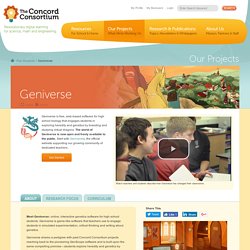
Our research study is examining how the Geniverse materials affect students’ genetics content knowledge and abilities to engage in scientific argumentation. In addition to pre- and post-tests for content knowledge, we will measure both student motivation and the degree of fidelity of implementation of Geniverse. Student demographic variables (race/ethnicity and gender) are being collected to examine if the Geniverse materials provide equitable opportunities for students to learn. We are also examining the affects of a range of teacher characteristics (years using Geniverse, familiarity with instructional technologies, genetics background and experience with scientific argumentation pedagogies) on student outcomes.
The research study began in the fall of 2012 with 48 teachers. Student Outcome Measures. Designing Learning Environments for Developing Understanding of Geometry and Space, 1998. This volume reflects an appreciation of the interactive roles of subject matter, teacher, student, and technologies in designing classrooms that promote understanding of geometry and space.
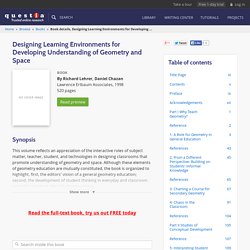
Although these elements of geometry education are mutually constituted, the book is organized to highlight, first, the editors' vision of a general geometry education; second, the development of student thinking in everyday and classroom contexts; and third, the role of technologies. Rather than looking to high school geometry as the locus--and all too often, the apex--of geometric reasoning, the contributors to this volume suggest that reasoning about space can and should be successfully integrated with other forms of mathematics, starting at the elementary level and continuing through high school.
ASSISTments. Andes Physics Tutor. Carnegie Learning. Cognitive Tutor Authoring Tools: Home. SimCalc@SRI. Kaput Center for Research and Innovation in STEM Education. SimCalc MathWorlds® Software ** To purchase a license using a purchase order or for volume licensing, please contact kaputcenter@umassd.edu.
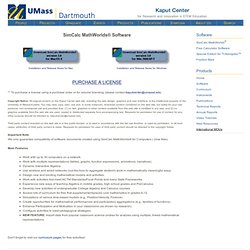
Copyright Notice: All original content on the Kaput Center web site, including the web design, graphics and user interface, is the intellectual property of the University of Massachusetts. You may view, copy, print, use and, in some instances, download content contained on the web site, but solely for your own personal, non-commercial use and provided that: (1) no text, graphics or other content available from this web site is modified in any way; and (2) no graphics available from the web site are used, copied or distributed separate from accompanying text.
Requests for permission for use of content for any other purpose should be directed to: kaputcenter@umassd.edu. Third party content included on this web site is in the public domain, or is used in accordance with the fair use doctrine, or used by permission. Main Features: Research & Development in Computing, Education, Biosciences, Chemistry, Earth & Space, Security & Defense, Sensing & Devices. WIDE World - Program Overview. Our goal is to transform school systems by developing professional communities of teachers and school leaders with interactive online courses and on-site support programs that enable schools to cultivate the critical learning students need for the 21st century world.
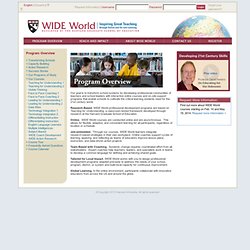
Research-Based. WIDE World professional development programs are based on Teaching for Understanding, a classroom-tested framework developed through research at the Harvard Graduate School of Education. Online. WIDE World courses are conducted online and are asynchronous. Teaching for Understanding: What is Teaching for Understanding? Iris Tabak and Brian Reiser: Scaffolding - ISLS NAPLES Network - LMU Munich. Lifelong Kindergarten. Research on Scratch - Imagine, Program, Share. ScratchEd.
Situating Constructionism. By Seymour Papert and Idit Harel The following essay is the first chapter in Seymour Papert and Idit Harel's book Constructionism (Ablex Publishing Corporation, 1991).
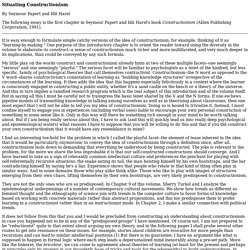
It is easy enough to formulate simple catchy versions of the idea of constructionism; for example, thinking of it as "learning-by-making. " One purpose of this introductory chapter is to orient the reader toward using the diversity in the volume to elaborate--to construct--a sense of constructionism much richer and more multifaceted, and very much deeper in its implications, than could be conveyed by any such formula. My little play on the words construct and constructionism already hints at two of these multiple facets--one seemingly "serious" and one seemingly "playful. " The serious facet will be familiar to psychologists as a tenet of the kindred, but less specific, family of psychological theories that call themselves contructivist.
They are not the only ones who are so predisposed. Footnotes References. Learning.media.mit.edu/content/publications/EA.Piaget _ Papert.pdf. Professor Seymour Papert. Classroom tech: A history of hype and disappointment. Adriene Hill | May 28, 2014 In 1976, Liza Loop went to a meeting of the Homebrew Computer Club, in Silicon Valley.
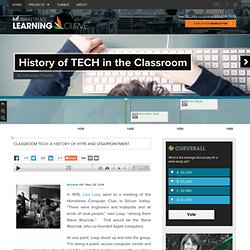
“There were engineers and hobbyists and all kinds of neat people,” said Loop, “among them Steve Wozniak.” That would be the Steve Wozniak, who co-founded Apple computers. At one point, Loop stood up and told the group, “I’m doing a public access computer center and I’m taking computers into schools.” It’s a goal that might sound pretty mundane today, but at the time, it was almost radical. Woz was impressed. For everything that Apple has become today, that first computer was not a great success. Loop said it took forever to load BASIC, a programming language.
That’s been the story of technology in the classroom, pretty much from the start. Cdn.nmc.org/media/2014-nmc-horizon-report-he-EN-SC.pdf. Reading List.